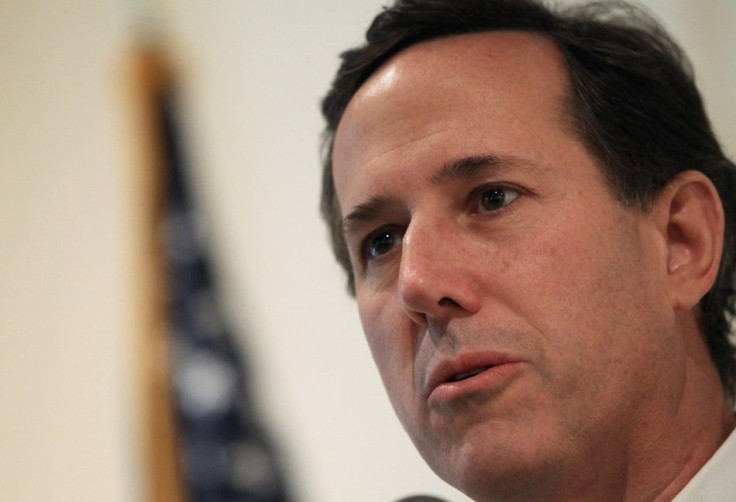Why the Santorum Surge Isn’t the End of Romney
Analysis

After Rick Santorum won the Iowa caucuses in January, the longshot candidate saw his star rise for the first time in the Republican primary race, only for it to be dashed by his weak performances among voters in New Hampshire and South Carolina.
Now, having managed to come out on top in four of his party's first nine nominating contests (although three of those wins didn't earn him any delegates) a Santorum surge is again underway. The staunch Catholic conservative is surpassing Mitt Romney -- the campaign's long-presumed nominee -- in three of four national polls, inching ahead in Romney's native state, Michigan, and, according to media reports, made a splash at the recent Conservative Political Action Conference.
Despite his recent success, it seems implausible that Santorum will win the nomination. The website Intrade still predicts Romney has a 75 percent chance of winning, while even headlines touting Santorum's triumphs seem to focus on how long his turn on top can possibly last.
That's probably because Americans, or at least the media, have caught on to three defining factors of the roller-coaster ride that has defined the Republican campaign.
'Surges' Have Defined the Race
Simply put, we've been here before: Michelle Bachmann, Rick Perry, Herman Cain, Newt Gingrich -- every candidate, aside from possibly Ron Paul, has had time to shine this primary season.
One after another, each of the hopefuls has been dubbed the anti-Romney, the person conservative Republicans could depend on to unite the party and avoid what is increasingly being seen as inevitable: a Romney nomination.
Santorum stood strong during the pre-Iowa Bachmann mania, the brief Perry love affair and the nation's introduction to the Cain Train. At this point, it seems logical that a Santorum surge would eventually, painstakingly follow.
Romney, on the other hand, has hovered near the top of the polls since he threw his hat into the ring. If the pattern continues, Santorum's star will fall, allowing Romney to come back on top and opinion-makers to reluctantly predict -- again -- that a Romney challenge to President Barack Obama is inescapable.
Endorsements
Santorum isn't a guy who political insiders, lawmakers or even celebrities -- aside from the Duggar family of reality TV fame -- are jumping on board to support. Even Gingrich, who has burned bridges with his former Republican colleagues to the point that one of them has publicly called him an evil person, managed to win endorsements from erstwhile rivals Perry and Cain.
Meanwhile, Romney has picked up at least 77 endorsements from members of Congress alone, according to Roll Call, while Santorum has only three -- all from his home state of Pennsylvania. Even after his recent wins in Colorado, Minnesota and Missouri he was mainly endorsed by conservatives who no longer hold political office and a handful of unknown state representatives.
Even as Republicans rail against Romney for his supposed history as a Massachusetts moderate, they're still not rallying behind Santorum, who is practically in lockstep with the party on almost every major issue. Unless he somehow inspires excitement from influential opinion makers who can defend him from the Romney attacks that are sure to occur in upcoming primaries, Santorum's chances of winning widespread public support will remain slim.
The Money Problem
Given his background, it probably goes without saying that Romney has much more money than Santorum. So does his campaign and the super PACs that have backed him.
The Florida primary was a prime example of how political spending can turn the tides of an election. Gingrich, fresh off his win in South Carolina, with his campaign empowered by a multimillion-dollar contribution from casino mogul Sheldon Adelson, still withered in the face of the approximately $15.3 million the pro-Romney super PAC Restore Our Future dropped on ad spending in the Sunshine State.
The super PAC's massive bankroll resulted in a slew of vicious attack ads -- 12,768 in the weeks of campaigning, compared to Gingrich's 210 -- that one study suggests was a huge contribution to Romney's win in Florida.
Restore Our Future continues to outspend its rivals in Michigan and Arizona, which will hold primary votes Feb. 28. While Santorum, like Gingrich, has been flooded with small campaign contributions and the support of one extremely wealthy super PAC backer, it may not be enough compete with the ad-buy power of the Romney camp.
© Copyright IBTimes 2024. All rights reserved.











